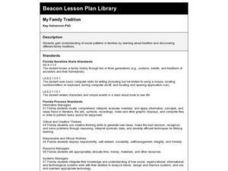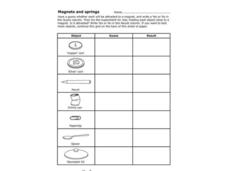Curated OER
Physical or Chemical Change
In this matter worksheet, students read statements about changes happening to matter and classify the change as either a physical or a chemical change. This worksheet is a graphic organizer.
Curated OER
What Are Physical and Chemical Properties?
In this properties worksheet, students compare and contrast physical properties and chemical properties. This worksheet is a graphic organizer.
Curated OER
The Flow of Energy Through a Food Chain
In this food chain worksheet, students write in the steps that show how energy flows through a food chain, from producers to consumers. This worksheet is a graphic organizer.
Curated OER
What Are Some Different Food Chains?
In this food chains worksheet, students compare and contrast examples of food chains in aquatic and terrestrial habitats. This worksheet is a graphic organizer.
Curated OER
Climate and Weather
In this climate worksheet, students read 4 statements about different causes of climate patterns or weather changes. Students write in the effect of these causes in this graphic organizer.
Curated OER
What Are Solutions?
In this solutions worksheet, students brainstorm different types of solutions and an example of each type of solution. This worksheet is a graphic organizer.
Curated OER
Forces That Move Objects
In this forces worksheet, students complete a graphic organizer by writing in examples of simple machines that can apply forces to move objects.
Curated OER
How Do Sounds Change?
In this sounds worksheet, students compare how different pitches and volumes of sounds are created. This worksheet is a graphic organizer.
Curated OER
How Do We Use Water?
In this water use worksheet, students brainstorm different ways people use water and then complete 3 fill in the blank statements about how people can keep water clean. This worksheet is a graphic organizer.
Curated OER
Comparing Animals and Decomposers Venn Diagram
In this science worksheet, students complete a Venn diagram in which they compare animals to decomposers. They complete the three part graphic organizer.
Curated OER
Comparing Minibeasts
In this "Comparing Minibeasts Data Worksheet", students respond to four short answer, one drawing, and eight graphic organizer questions.
Curated OER
Living Things?
In this living things graphic organizer worksheet, learners decide whether the 10 things listed are living or not as they consider the 7 attributes included on the chart.
Curated OER
What Do Plants Make?
In this plant worksheet, students study the items that are made from plants. Students complete 2 sides of the graphic organizer that is given filling in that which comes from plants and that which does not.
Curated OER
Nonfiction KWL Chart
In this KWL Chart worksheet, student students choose a book title or topic and fill out a chart based on what they already know, what they wonder about, and what they have learned.
Curated OER
Fairy Tales
Once upon a time are four words most children are familiar with when reading a fairy tale. But do they know that fairy tales are a great way to learn the literary elements of reading and writing? Use a thorough fairy tale unit...
Roald Dahl
James and the Giant Peach Lesson Plans
Immerse yourself in the world of giant bugs, rolling peaches, and brave little boys with an interdisciplinary unit on James and the Giant Peach. Young readers focus on the scientific themes of Roald Dahl's classic novel with bug hunts,...
Curated OER
Effects of Acid Rain
Third graders explore the concept of acid rain and its effects on ecosystems. They are placed in groups and using a graphic organizer they brainstorm their ideas about what would happen to the ecosystems living within these environments...
Curated OER
Animals at the Zoo
Students identify a variety of animals that can be found at the zoo and select one to conduct research on. In pairs they conduct Internet research, complete a graphic organizer chart, and create a two slide PowerPoint presentation.
Curated OER
Plant Cycles
Students identify plants parts and their functions. In this plant cycle lesson, students examine parts of plants and how the parts help them survive in its environment. Students use graphic organizers, the internet, books and...
Curated OER
My Family Tradition
Young scholars examine different family traditions to further explain social patterns. They complete a graphic organizer using educational software.
Curated OER
Light Is Amazing
Young scholars investigate light and its energy. They discuss the properties of light, research how much light the moon absorbed on their birthday on a website, complete a graphic organizer, and create a kaleidoscope.
Curated OER
Friction
In this friction worksheet, students examine objects around them by writing details in the graphic organizer. Headings include high friction, low friction, useful, and not useful. Pictures are provided to prompt students.
Curated OER
Magnets and Springs
In this magnetism worksheet, students complete a graphic organizer by predicting which of the 7 pictured objects will be attracted to a magnet and which ones will not. They write their own experiment about whether an object will or will...
American Chemical Society
Change in Temperature - Endothermic Reaction
Now that learners have been exposed to chemical changes, they learn that some take in heat and therefore, decrease in temperature. The same reaction that they have been investigating between baking soda and vinegar is revisited,...























